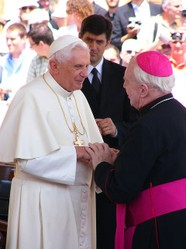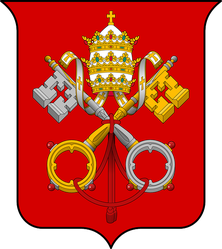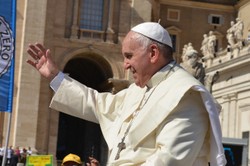Joseph Ratzinger, Benedict's birth name, was born in 1927 in the predominantly Catholic state of Bavaria into a devoutly Catholic and politically moderate family with three children. (Benedict was his regnal name.) His father was a police officer who took a firm line with misbehaviour by Nazi thugs,arresting several of them.the environment of the home was devout. Joseph senior provided the intellectual rigour of young Joseph's life while mother contributed a strong devotional element. This combination of rigorous thought and deep Catholic devotion was to form a firm grounding to the future pope's religious life. It certainly led to both sons becoming priests. The home was deeply musical, and both priestly sons carried musicality with them throughout their lives. Joseph,the younger of the two, was by far the most intellectually talented and began to do well academically.
When Joseph was six the Nazis, whom his father had actively resisted, took power, leaving the family into a politically precarious position. This led to the family's moving a few times to different, more amenable areas before Joseph senior took a police pension and retired to a small farm away from the more politically dangerous larger places. There the Ratzinger family lived in hope of the eventual ending of Nazi tyranny. At this stage they looked for a future beyond the darkness through which they could not see.
Young Joseph's teens were lived under the shadow of the tyrant. He went to the Catholic junior seminary, a training school for boys wanting to be priests, at the age of twelve, which provided something of a shelter from pressure to join the Hitler youth, but the respite from tyranny was not to be long. Eventually all boys were compulsorily enroĺled in this movement, and the punishment for not joining was that the boy's father would be sent to a concentration camp. Joseph's solution was to attend one meeting and, I suspect, make himself so useless that no one complained that this physically weak inadequate never came to another meeting.
Eventually at the age of eighteen he was drafted, but did military service in an auxiliary anti aircraft unit. Luckily he did not need to fight, as he was involved in sending communications to gunners. This was a miserable time in his life. In 1945 he saw a column of Jews and others being marched from one camp to another,but was powerless to assist, as complaints were punished by instant death. In one incident a senior Nazi visited Joseph's unit to tell them that they were all volunteering for the SS. Joseph resolutely refused and said that he was a Catholic training for the priesthood. This was a risky testimony, but the shocked official did not press the point.
Eventually, as the war was ending Joseph deserted his unit and headed for home. He did not stay long at home, as he was taken prisoner by the Americans and spent some time in a prison camp, but he must not have been a threat, as he was soon released and free to resume his priestly studies. We see here a young man trying to survive with his conscience unsuĺlied under an appalling tyranny and succeeding.His life was on a course set for God and he was still on target.










 Darkness over the Earth the skies darkened when Jesus was crucified16 days ago
Darkness over the Earth the skies darkened when Jesus was crucified16 days ago
 TheThousand Year Gardenon 11/26/2025
TheThousand Year Gardenon 11/26/2025
 Women of the Gospelson 10/11/2025
Women of the Gospelson 10/11/2025
 Religious Gardenson 08/25/2025
Religious Gardenson 08/25/2025



Comments
A committee of cardinals headed by the Secretary of state runs the church, and a cardinal called the Camerlengo organisesbthe funeral.
Thank you!
The Vatican has precise procedures for the time between one papal term ended and another papal term launched, correct?
Is it a group or one person that manages that interim?
No. There is no hereditary successor to the pope, so there cannot be an automatic succession. The mediaeval church strove hard to oppose attempts at automatic, hereditary succession.
Thank you!
Might that be the same reason for the papal coronation?
UK law states that the moment that a sovereign dies their successor becomes monarch. So the instant that Elizabeth died Charles became king. The coronation does not make the successor a monarch, but is a way of signalling to the world that there is a monarch in place and making a show for the people.
Intervals between papal election and coronation bring to mind the lags between one monarch dying and another being crowned, such as the timespan between Queen Elizabeth II's passing and King Charles III being so crowned.
So it's a somewhat related, somewhat unrelated question that I'm posing. Is there a minimum and a maximum amount of time during which royal coronations take place?
There is not a specified time between papal election and coronation, but there is a rough time interval expected, a few weeks.
Thank you!
I misinterpreted the cassock-making as occurring between the announcement and the coronation even as it actually must be between the need (for the announcement and the coronation, because of death) and the announcement.
Would there always be a set amount of time between the announcement and the coronation?
You know, like in another context (Unitedstatesian political) in another country (west-pond US ;-D), the November presidential election traditionally signifies a January presidential inauguration?
I don't know for sure, but once the identity of the new pope is settled a better fitting cassock can be created.
The computer crashed before I could add my amused observation to your three-cassock comment regarding papal coronationations.
Might the three sizes be for maintaining weight, losing weight, gaining weight?
If so, how much of a weight allowance would there be for gaining and losing weight?